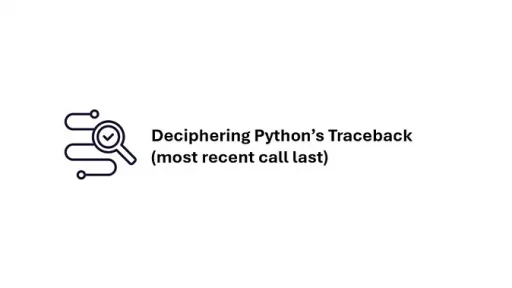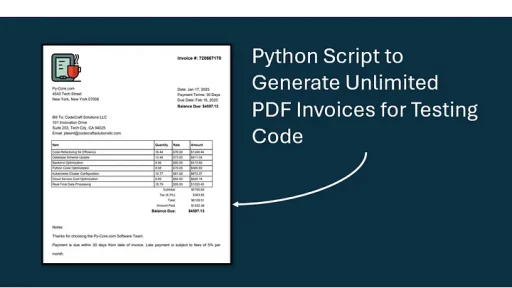Python’s support for unpacking sequences is super useful. Unpacking, also known as “multiple assignment” or “iterable unpacking,” refers to the process of assigning values from a sequence to multiple variables in a single step. This feature works with tuples, lists, and other iterable sequences.
What is Iterable Unpacking?
Consider this tuple:
coordinates = (10, 20, 30)Instead of accessing each element individually like this:
x = coordinates[0]
y = coordinates[1]
z = coordinates[2]
print(x, y, z) # Output: 10 20 30Python lets you assign values to variables simultaneously, like this:
x, y, z = coordinates
print(x, y, z) # Output: 10 20 30With a single line, you assign three variables without the need for index-based access.
Working with Lists
Unpacking is not limited to tuples. Lists work the same way:
data = [1, 2, 3]
a, b, c = data
print(a, b, c) # Output: 1 2 3Unpack to extract specific parts of a list while discarding the rest:
numbers = [1, 2, 3, 4, 5]
first, *middle, last = numbers
print(first) # Output: 1
print(middle) # Output: [2, 3, 4]
print(last) # Output: 5Here’s what happens step-by-step:
firstgets assigned the first element of the list:1.- The
*middlevariable collects all elements between the first and last into a list:[2, 3, 4]. lastgets assigned the final element of the list:5.
The key here is the * operator. Python uses it to gather the remaining elements of the iterable into a list. It does not analyze the semantics of the sequence (e.g., what “middle” means). Instead, it simply distributes the elements according to the unpacking structure you’ve defined.
Example with a Shorter List
The same syntax with a shorter list:
numbers = [1, 2]
first, *middle, last = numbersThe result will be:
firstgets1.middlegets an empty list[](because there are no elements between the first and last).lastgets2.
Flexibility
This approach works with sequences of any length, as long as there’s at least one element for first and last. Python doesn’t need to “understand” the content of the list—it just follows the unpacking pattern you provide.
Unpacking Other Sequences
Python supports unpacking for any iterable, not just tuples and lists. Strings, for instance, can be unpacked:
word = "hello"
a, b, c, d, e = word
print(a, b) # Output: h eUnpack generator objects:
gen = (i**2 for i in range(3))
a, b, c = gen
print(a, b, c) # Output: 0 1 4Dictionaries can be partially unpacked, but their keys — not values — are extracted by default:
my_dict = {'name': 'Alice', 'age': 30}
key1, key2 = my_dict
print(key1, key2) # Output: name ageFor values, use .values():
val1, val2 = my_dict.values()
print(val1, val2) # Output: Alice 30Strengths of Unpacking
Clarity
Unpacking reduces boilerplate code. Assigning multiple variables becomes straightforward.
Flexibility
The * operator allows for extracting only the parts you need. For example:
data = [100, 200, 300, 400]
first, *rest = data
print(first, rest) # Output: 100 [200, 300, 400]Compatibility
Unpacking works seamlessly with most iterables. This makes it ideal for working with custom objects.
Weaknesses of Unpacking
Errors with Mismatched Lengths
Unpacking requires the number of variables to match the elements in the sequence unless you use the * operator. Otherwise, Python raises a ValueError:
values = [1, 2]
a, b, c = values # Raises ValueError: not enough values to unpackReduced Readability in Complex Cases
Overusing unpacking can make code harder to follow, especially when combined with advanced structures:
data = [(1, 2), (3, 4), (5, 6)]
for (a, b) in data:
print(a + b)- While elegant, this style may confuse readers unfamiliar with nested unpacking.
- Performance in Large Sequences
Using the*operator copies remaining elements into a list. This can impact performance with large sequences.
big_list = list(range(10**6))
first, *rest = big_list # Creates a new list for 'rest'Advanced Unpacking Techniques
Unpacking pairs well with iterating through sequences:
pairs = [(1, 'a'), (2, 'b'), (3, 'c')]
for number, letter in pairs:
print(number, letter)Another use case is swapping variables without a temporary variable:
x, y = 5, 10
x, y = y, x
print(x, y) # Output: 10 5Using unpacking with function arguments:
def greet(first, last):
return f"Hello, {first} {last}"
names = ["Jane", "Doe"]
print(greet(*names)) # Output: Hello, Jane DoeThank you for reading this article. I hope you found it helpful and informative. If you have any questions, or if you would like to suggest new Python code examples or topics for future tutorials, please feel free to reach out. Your feedback and suggestions are always welcome!
Happy coding!
Py-Core.com Python Programming
You can also find this article at Medium.commedium.com/python-in-plain-english/unpacking-tuples-lists-and-other-sequences-in-python-5c6977d3187a


